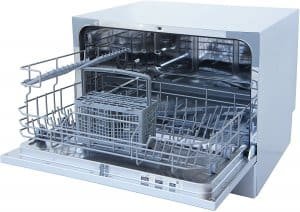Are you tired of opening your dishwasher only to find wet dishes that need to be dried manually? A dishwasher not drying dishes can be frustrating, time-consuming, and defeat the purpose of having a dishwasher. But don’t worry; we’ve got you covered with this comprehensive guide to help you troubleshoot and fix the issue.
Table of Contents
Understanding the Drying Process in Dishwashers
Before we dive into the solutions, let’s first understand how a dishwasher dries dishes. Most dishwashers use one of two methods to dry dishes: condensation drying or heated drying.
- Condensation Drying – This method involves using the residual heat from the final rinse cycle to evaporate the water droplets on the dishes. The steam then condenses on the cooler walls of the dishwasher and drains away.
- Heated Drying – This method uses a heating element to raise the temperature of the air inside the dishwasher and speed up the evaporation process.
Now that we know the basics let’s move on to the troubleshooting tips.
Common Reasons Why a Dishwasher Isn’t Drying Dishes
There can be various reasons why a dishwasher isn’t drying dishes. Some of the most common ones include:
Clogged Dishwasher Filter
A clogged filter can restrict the flow of air and prevent it from circulating properly, which can hinder the drying process. To fix this, locate the filter (usually at the bottom of the dishwasher), remove it, and clean it thoroughly.
Overloading the Dishwasher
Overloading the dishwasher can prevent proper air circulation and hinder the drying process. Try loading fewer dishes and utensils and ensure that they aren’t touching each other.
Improper Loading of Dishes
Improper loading of dishes can prevent the water from draining away properly, leading to wet dishes. Ensure that the dishes are facing downwards and that there are no obstructions that can prevent the water from draining away.
Faulty Heating Element
A faulty heating element can prevent the dishwasher from reaching the required temperature for proper drying. You can test the heating element with a multimeter or call a professional to replace it.
Wet Dishwasher Interior
If the dishwasher’s interior is wet before starting the cycle, it can hinder the drying process. Try wiping the interior dry before starting the cycle to prevent this issue.
Hard Water Deposits
Hard water deposits can leave spots on the dishes and prevent them from drying correctly. Try using a rinse aid or a vinegar and water solution to remove the hard water deposits.
Faulty Thermostat
A faulty thermostat can prevent the dishwasher from reaching the required temperature for proper drying. You can test the thermostat with a multimeter or call a professional to replace it.
Damaged Dishwasher Seal
A damaged dishwasher seal can prevent the dishwasher from maintaining the required temperature, leading to improper drying. You can inspect the seal for any damages or call a professional to replace it.

Can I use a different detergent to help with the drying process?
Yes, using a high-quality detergent that contains a rinse aid can help improve the drying process.
Why are some of my dishes still wet even after using a rinse aid?
This can be due to various reasons, such as overloading the dishwasher, improper loading of dishes, or a faulty heating element or thermostat. Check these factors and try again.
Can I use a hairdryer to dry the dishes manually?
It’s not recommended to use a hairdryer or any other heat source to dry dishes manually, as it can damage the dishes and potentially cause a fire hazard.
Can hard water deposits be prevented?
Yes, you can install a water softener or use a dishwasher cleaner that removes hard water deposits to prevent them from accumulating on your dishes.
How often should I clean the dishwasher filter?
It’s recommended to clean the dishwasher filter at least once a month to prevent clogs and ensure proper airflow for drying.
Why is my dishwasher not drying?
Your dishwasher may not be drying properly for a few different reasons. First, it could be that the heating element is not functioning properly. This element is responsible for heating up the water so that it evaporates during the drying cycle. If the heating element is broken or defective, then the dishes will not dry properly.
Another possible reason could be that your dishwasher does not have enough air circulation to allow the water to evaporate. Make sure that there are no obstructions blocking air flow around your dishwasher and check to see if any of the vents are clogged or blocked.
Finally, you should make sure that you are using a rinse aid in your dishwasher as this helps to reduce surface tension of water droplets which allows them to evaporate more quickly and efficiently during the drying cycle.
Conclusion
A dishwasher not drying dishes can be a frustrating issue, but by following these troubleshooting tips and solutions, you can fix the problem and enjoy dry dishes once again. Remember to regularly clean the dishwasher filter, avoid overloading the dishwasher, load dishes properly, and check for any faults in the heating element, thermostat, or seal.

